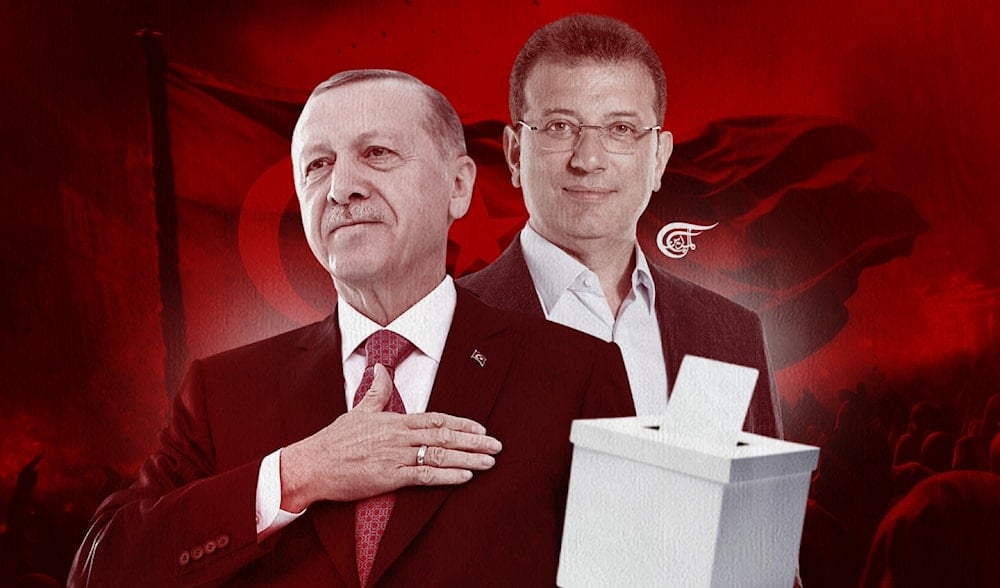Turkey's local elections and Erdogan's race for Istanbul and Ankara
The key switch in this year's local elections is Istanbul alongside Ankara - one for the money and two for the power. This local election goes much deeper than it seems and serves a fateful purpose for Erdogan, because at the moment he doesn't have enough parliamentary seats to enact a new constitution that would allow him to run for a third term after 2028.
-

An image of Turkish President Recep Tayyip Erdogan and Istanbul Mayor Ekrem Imamoglu (Illustrated by: Zeinab el Hajj, Al Mayadeen English)
'Lafla peynir gemisi yürümez' - literally translates to 'the cheese ship does not run on words' - or simply put, actions speak louder than words.
That's something Turkish President Recep Tayyip Erdogan's party is going to have to prove amid the ongoing local and municipal elections if he wants to keep the upper hand in Turkish politics.
We've all witnessed the tough presidential elections last year in Turkey, but current events in Turkey, such as the skyrocketing inflation and the February 6 devastating earthquakes, played and continue to play a pivotal role in both Erdogan and his party's fate, especially in the way he has responded to the aftermath of the earthquake and economic mismanagement.
The key switch in this year's local elections is Istanbul alongside Ankara - one for the money and two for the power. This local election goes much deeper than it seems and serves a fateful purpose for Erdogan because, at the moment, he doesn't have enough parliamentary seats to enact a new constitution that would allow him to run for a third term after 2028.
Sunday and the day after will prove to be a game changer. Erdogan has nominated Murat Kurum as his party's candidate for the mayor of Istanbul against the opposition's current Istanbul mayor, Ekrem İmamoğlu. In Ankara, it's Erdogan's pick Turgut Altinok against the opposition's Mansur Yavaş.
With the last local elections held in 2019, the two major political parties - the AKP (Adalet ve Kalkinma partisi) and the CHP (Cumhuriyet ve Halk Partisi) - have been going head to head since then and are currently competing for the two cities that will set the stage for the upcoming presidential battle: Istanbul and Ankara.
The 'Wall Street' of Turkey
There are 34 political parties participating in the elections, among them are the AKP and MHP (the Nationalist Party) which are now under the coalition Cumhur ittifaki, CHP, Gelecek Partisi (the Future party), the HDP (now DEM or the Kurdish political party) and the IYI partisi (the Good Party).
Voting is being done in 81 provinces, 973 districts, 390 municipalities for 50,336 muhtarlar (village councilman or headman). 61 million people are expected to vote.
The major cities of Adana, Ankara, Istanbul, Hatay, Izmir, Mersin, and Tekirdag are under CHP rule, while Bursa, Erzurum, Gaziantep, Kahramanmaras, Trabzon, Konya, Sanliurfa are under the AKP. The towns of Diyarbakir, Mardin, and Van remain under the HDP.
The CHP was led by Kemal Kilicdaroglu who ran against Erdogan last year in the presidential race, but Kilicdaroglu has left since then, and the party is now led by Özgür Özel. Still, the CHP isn’t in a much better position either after it failed to unite the coalition it tried to form in last year's presidential elections and its own candidates are currently busy butting heads.
Istanbul remains quite valuable for Erdogan, first because it is the city where his grand career began in 1994 and second because of the money it brings in for the country with it being the 'Wall Street' of Turkey.
Of course, Istanbul is where the money's at and Ankara is the political centerstage, which explains why Erdogan is trying to have the AKP win back what they lost in 2019 to the CHP's Imamoglu in Istanbul, especially now that he's under fire for economic mismanagement of the country's recession.
Sunday’s elections will be a race to gain the upper hand in order to set the rules in the country according to the winner’s own terms - meaning that if the CHP takes the majority, they set the rules.
If Erdogan wins, it's his constitution. But here's a quick head-scratcher for you: If Erdogan's party wins both cities, will he still not run for another term in a few years like he said or do you think that'll make him change his mind?
'Hayırlı olsun' - literally translates to 'may it be good' - or complexly simplified, may the best "abi" win.

 4 Min Read
4 Min Read








